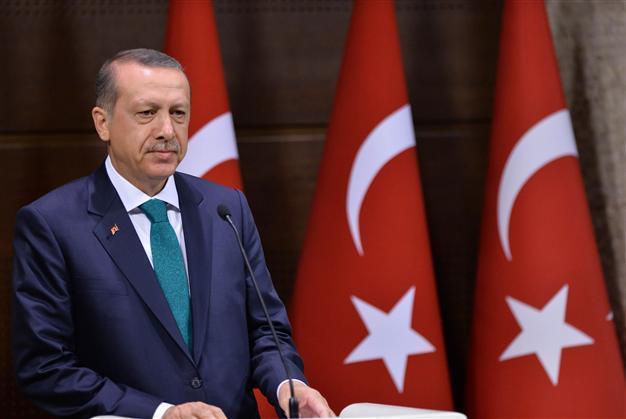Government takes steps on headscarf, Kurds, electoral system
ANKARA - Hürriyet Daily News

Prime Minister Recep Tayyip Erdoğan revealed the details of a democratization package at a press conference in Ankara on Sept 30. DAILY NEWS photo, Selahattin SÖNMEZ
The Turkish government will lift its much-debated ban on wearing headscarves in public offices, permit education in mother tongues in private schools and commence a debate on the country’s much-criticized electoral system with a long-anticipated democratization package announced yesterday.Prime Minister Recep Tayyip Erdoğan said the package was a result of Turkey’s "democratization history," particularly over the last 11 years. “This package is not a first and will not be the last package of such reforms,” Erdoğan said, stressing that the package was not the “final point” of a reform process that he claimed the ruling party had been pursuing since coming to power in 2002.
“Turkey is progressing irreversibly toward democracy. This package is a fundamental and historic phase of this progress,” he said at the press conference in Ankara. He read a statement and outlined the reform list but did not take questions.
Erdoğan also said the democratization package was a critical step to "stopping bloodshed" in Turkey, and that the package was a result of the demands of the families of fallen soldiers, designed to end terrorism.
“Cowards cannot erect victory monuments. Those who are afraid of change, reforms and advanced standards cannot proceed even one step forward,” he said.
Denying opposition criticism that the package was drafted after negotiating with Abdullah Öcalan, the jailed leader of the outlawed Kurdistan Workers’ Party (PKK), the prime minister said: “This package is not a result of any bargaining or negotiation. It is a result of the people’s demands.”
“Our reference is international human rights, the European Union acquis and the works of the Wise People [during the peace process],” Erdoğan said. According to his statements, a good majority of reforms would be carried out through legal amendments but for the remainder, administrative steps would suffice.
Electoral system to be changed
Turkey’s much-criticized election system will likely be overhauled as part of the democratization package. Offering two different alternatives for lowering the 10 percent nationwide election threshold, Erdoğan suggested that the election threshold be lowered to 5 percent while implementing a narrowed constituency system in groups of five deputies for each constituency.
“We can remove the threshold altogether and fully implement the single-member district system,” Erdoğan said, adding that a proposal on the election threshold would be discussed when Parliament's resumes work today.
The 7 percent threshold for political parties to receive financial aid from the Treasury will be reduced to 3 percent as part of the package, paving the way for more parties to obtain financial support.
The government will also permit campaigning in different languages for political parties, including during non-election times. “With another change, we are also opening the way for political parties to have co-chairs,” Erdoğan said.
The Peace and Democracy Party (BDP) and some leftist parties have already had a de facto co-chair system, but this amendment will make the co-chair system legal.
* This video shows a compilation of the prime minister's speech, with English subtitles provided by public broadcaster TRT Türk.
Headscarf ban to remain in military, police
Prime Minister Erdoğan said his government would remove a headscarf ban for public servants in public institutions, except for judges, prosecutors, police officers and members of the army.
In an unexpected inclusion, a prison sentence will be given to those who "prevent someone from performing their religious duties," he added.
“Those who prevent people from performing their religious duties and those who intervene to [change] people’s lifestyles originating from their belief by threat or by use of force will be sentenced to between one and three years in prison,” Erdoğan said.
“We will also increase the prison sentence for hate crimes from one year to three years to fight against discrimination,” he said, adding that punishments for hate crimes, particularly those committed based on religion, nation or ethnicity, would be made stricter.
An institution to fight against discrimination will also be established.
Erdoğan further promised to end penalties for the use of certain letters, such as “q,” “w” and “x,” which are used in Kurdish but forbidden in official documents in Turkey. Legal obstacles against restoring the original names of villages will also be eliminated.
Move for Mor Gabriel lands
The restoration of names of provinces requires a legal amendment, and the government will take such demands into consideration, he said, in an apparent reference to long-time demands to change the name of the eastern province of Tunceli back to Dersim.
In the only step included in the package for Alevis, Erdoğan said the name of Nevşehir University in the Central Anatolian province of Nevşehir would be altered to Hacı Bektaş Veli University, in honor of a medieval Alevi mystic who lived in a village near Nevşehir.
The land of the Mor Gabriel Monastery will be given back to a Syriac Christian community foundation, while a Roma culture and language institution, as well as an institute that will work on problems of Roma minorities in the country, will also be established.
The student oath, which starts with the words “I’m Turkish, righteous, and hardworking,” will also no longer be read in primary schools.
The obstacles standing against membership in political parties will also be removed with a new amendment. Thanks to this amendment, all public servants, including judges, prosecutors, police and army officers, will be able to become members of political parties.
Regulations on rallies and demonstrations will also be eased to increase the freedom of assembly by extending the permitted period of demonstrations. The implementation of the government commissioner in rallies and demonstrations will be abolished and the powers of the government commissioner will be assigned to a regulatory authority through an amendment. The regulatory authority will decide to disperse rallies in the event of any unlawfulness, according to the same amendment.
















